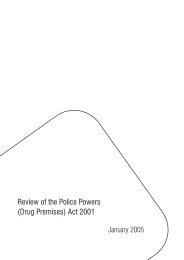Crimes (Forensic Procedures) Act 2000 - NSW Ombudsman - NSW ...
Crimes (Forensic Procedures) Act 2000 - NSW Ombudsman - NSW ...
Crimes (Forensic Procedures) Act 2000 - NSW Ombudsman - NSW ...
Create successful ePaper yourself
Turn your PDF publications into a flip-book with our unique Google optimized e-Paper software.
8.2. Access to interview friends, independent witnesses and interpreters<br />
8.2.1. Interview friends<br />
The <strong>Act</strong> gives certain suspects the right to have an ‘interview friend’ present. An interview friend is essentially a<br />
support person and advocate for the suspect. An interview friend includes persons such as a parent, guardian, legal<br />
representative, or other person acceptable to the suspect. 716 Where the <strong>Act</strong> provides that a suspect must be informed<br />
about a matter and an interview friend is present, the interview friend must also be informed. Interview friends may<br />
also make requests or objections on the suspect’s behalf. 717<br />
The <strong>Act</strong> provides for interview friends in the following circumstances:<br />
• Children and incapable persons can only undergo a forensic procedure by order of a court, and must have<br />
an interview friend present at the hearing (or for interim orders only when this is reasonably practicable). The<br />
forensic procedure must generally (i.e. if reasonably practicable) be carried out in the presence of the interview<br />
friend or a legal practitioner. 718<br />
• Aboriginal and Torres Strait Islander suspects must have an interview friend present when police ask<br />
the suspect to consent to a forensic procedure. If police apply for a court order, the suspect must have an<br />
interview friend present at the hearing. The forensic procedure must generally (i.e. if reasonably practicable)<br />
be carried out in the presence of the interview friend or a legal practitioner. Aboriginal and Torres Strait Islander<br />
suspects may waive their right to have an interview friend present. 719<br />
The court may exclude an interview friend if the interview friend unreasonably interferes or obstructs the hearing of the<br />
application. An interview friend (other than a legal representative) may also be excluded from the request for consent<br />
or the place where the forensic procedure is to be carried out if:<br />
(a) the interview friend unreasonably interferes with or obstructs the carrying out of the procedure, or<br />
(b) the investigating police officer forms a belief based on reasonable grounds that the presence of the interview<br />
friend could be prejudicial to the investigation of an offence because the interview friend may be a cooffender<br />
of the suspect or may be involved in some other way, with the suspect, in the commission of<br />
the offence. 720<br />
If an interview friend (other than a legal representative) is excluded under either of these provisions, the suspect<br />
or volunteer may choose another person as their interview friend. In the case of a child or incapable person, if the<br />
suspect or volunteer does not choose another interview friend, the police officer conducting the procedure “may<br />
arrange for any person who may act as an interview friend to be present”. 721 A similar provision applies if the suspect<br />
or volunteer is an adult Aboriginal or Torres Strait Islander, and does not waive their right to have an interview friend<br />
present. The interview friend can be a relative, legal practitioner or other person chosen by the suspect or volunteer. 722<br />
8.2.1.1. Compliance with the <strong>Act</strong><br />
There are two ways in which an interview friend is obtained for a suspect or volunteer entitled to one. Firstly, the<br />
person may identify the person (such as a parent). Secondly, local area commands may have a list of persons able<br />
to assist. Some of the commands we audited indicated they did not arrange for interview friends, on the basis that<br />
these persons may appear partial. Others indicated they did arrange for interview friends, and kept lists of names and<br />
contact details for people who could be used. One command had good relations with a local resident who was in<br />
the Salvation Army, who could be contacted at any time. Another command kept a list of Aboriginal elders with whom<br />
police have built relations with over time to refer to if they needed. Another command, which had a reasonably high<br />
Aboriginal population, said it was used to organising support people for Aboriginal suspects and that arranging for an<br />
interview friend for a forensic procedure was just as straightforward: “We do it every day.”<br />
Some officers said the main problem with interview friends is that it may take some time for an interview friend to<br />
attend. We acknowledge that waiting for an interview friend may cause delays, but note that this will be ‘time out’<br />
under section 3 of the <strong>Act</strong>. Further, if police liaise with local community members and service providers, and keep a<br />
list of contact details of people who can act as interview friends or independent persons, this may reduce any such<br />
delays and also the time the suspect spends in custody.<br />
We also examined this issue in our survey of local area commands where responses indicated that 16 commands<br />
had problems arranging appropriate interview friends. These problems mainly related to the person chosen being<br />
unsuitable. For example:<br />
<strong>NSW</strong> <strong>Ombudsman</strong><br />
DNA sampling and other forensic procedures conducted on suspects and volunteers under the <strong>Crimes</strong> (<strong>Forensic</strong> <strong>Procedures</strong>) <strong>Act</strong> <strong>2000</strong> 135

















